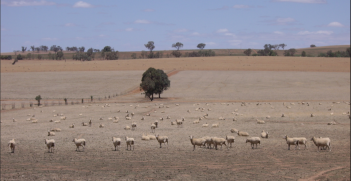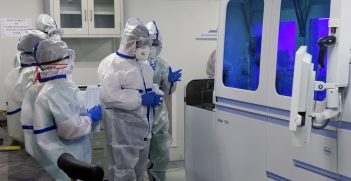Generating Evidence to Make Better Policy Decisions on the Ground in Indonesia

The COVID-19 pandemic has hit developing communities in ways which further highlight the need for data and evidence that can help them rebound better from the impact. Australia has an important role to play in supporting regional recovery.
Indonesia has the highest COVID-19 infection rate in Southeast Asia, with more than 18,000 deaths. The country has a huge informal work sector and its young people desperately need access to training and skills development. Understanding the best way to direct resources and efforts to lift opportunities for people is at the core of the research being undertaken by The Australia-Indonesia Centre. Now, these collaborative efforts on key economic and social challenges are being examined with the overlay of COVID-19.
Take, for example, the work of a team led by researchers from the University of Western Australia, Universitas Hasanuddin, and Universitas Airlangga into health and wellbeing issues amongst young people in eastern Indonesia. Speaking at a digital summit for the lead researchers, Professor Anu Rammohan said that COVID-19 has been a significant disruptor to the lives of the region’s youth. “We see the people that are already vulnerable to these health shocks and now finding themselves in a more difficult situation because of COVID-19. So, for instance, young people working in urban areas had to go back to their rural households and they’re facing restrictions on the ability to work,” she said.
The Partnership for Australia-Indonesia Research program (PAIR) is working in the province of South Sulawesi, one of the provinces hardest hit by COVID-19, and the most populated in eastern Indonesia. The teams have been collating information from local sources in preparation for when it can start collecting more data in the field.
According to group co-leader Dr Sudirman Nasir, the social, economic, and health issues amongst young people are underlying conditions that need to be better understood in regards to the high COVID-19 fatality rate. “We are going to try to tackle these root causes in relation to nutrition and also to health literacy, particularly among young people and more specifically to young women in order to enable us to reduce the root causes of our higher fatality rate that we are currently seeing,” said Dr Nasir.
The spread of COVID-19 has forced many young people to return home, which, conversely, has resulted in a higher output from the local seaweed industry. It is not well known that Indonesia is the world’s largest producer of carrageenan seaweed, an ingredient widely used in the food industry. The industry is a priority growth sector for the Indonesian government.
According to the co-lead of this project, Dr Scott Waldron, work will be done to obtain more data on family dynamics and household income which will inform policy ideas on how to improve the major local industry. “The data that we’ve seen on seaweed production, this year with COVID-19, suggests that a lot of younger people have returned back to farm to do things like seaweed harvesting, and that’s resulted in an increase in production of seaweed,” said Dr Waldron.
With young people returning to rural areas because of the pandemic, it could be argued that the imperative is even stronger to find ways to improve skills, productivity, and income. South Sulawesi accounts for about 20 percent of the global carrageenan seaweed market, and 40,000 families in the province rely on it. However, the seaweed is mostly sent offshore to China for processing, where it captures a higher value that is not returned to the farmer.
Understanding the whole-of-chain is a central element of the research project in this area being led by thepProfessors from the Institut Pertanian Bogor and University of Queensland. According to research group co-leader Professor Nunung Nuryartono, the research could identify business and marketing skills that young people could use to develop an opportunity. “On the marketing channel, young people could also be involved more deeply by creating digital marketing or digital platforms. And a combination between women and young people is very important for succeeding in seaweed production on-farm and off-farm,” said Professor Nuryartono.
The research is conducted under the Partnership for Australia-Indonesia Research program which is funded by the Australian government, partnering with 11 universities. Other work includes collecting information on the aspirations and needs of young people in the province, involving experts from Universitas Indonesia, Melbourne University, and Institut Teknologi Bandung.
As well, COVID-19 has been shown to have a disproportionate effect on women, and the researchers in this project will look at the work currently available and the kind of jobs that could be created. “I think one of the biggest gender constraints in agriculture and aquaculture along the coast is that a lot of young women are confined to the margins of the supply chain, production, and supply chain of seaweed and agricultural commodity production,” said co-lead Associate Professor Wolfram Dressler.
The recovery from COVID-19 will rely in part on improved infrastructure, and another group of researchers is looking at how the province’s first rail line can be most effective in creating people and business connections that benefit many. This research links Universitas Gadjah Mada, Monash University, and Institut Teknologi Sepuluh Nopember.
Project co-lead Prof Siti Malkhamah said the group would like to analyse the master plans at different government levels to ensure that other services link to the rail line so that communities can use them most effectively. “Many people live or work along the railway lines, but we need to have the contribution of the government from Sulawesi, and also from the Kota and Kabupaten to give or to improve the connectivity and also to have public transport routes,” said Professor Malkhamah.
The provincial government has just signed a Memorandum of Understanding with The Australia-Indonesia Centre to support the research work, which Governor Nurdin Abdullah said will assist with economic recovery from COVID-19. “In this case, what we want to achieve is not only economic recovery, but quality economic recovery and growth. Therefore, we hope that the PAIR assessment team can take a role in creating solutions, especially in dealing with the impact of the COVID-19 pandemic,” he said. The research will continue for the next three years, and the data and findings will be used to inform policy decisions that affect communities at the very centre of their lives and makes their futures brighter.
Helen Brown is a former Indonesia correspondent for ABC and now based in Melbourne for ABC News.
This article is published under a Creative Commons Licence and may be republished with attribution.





